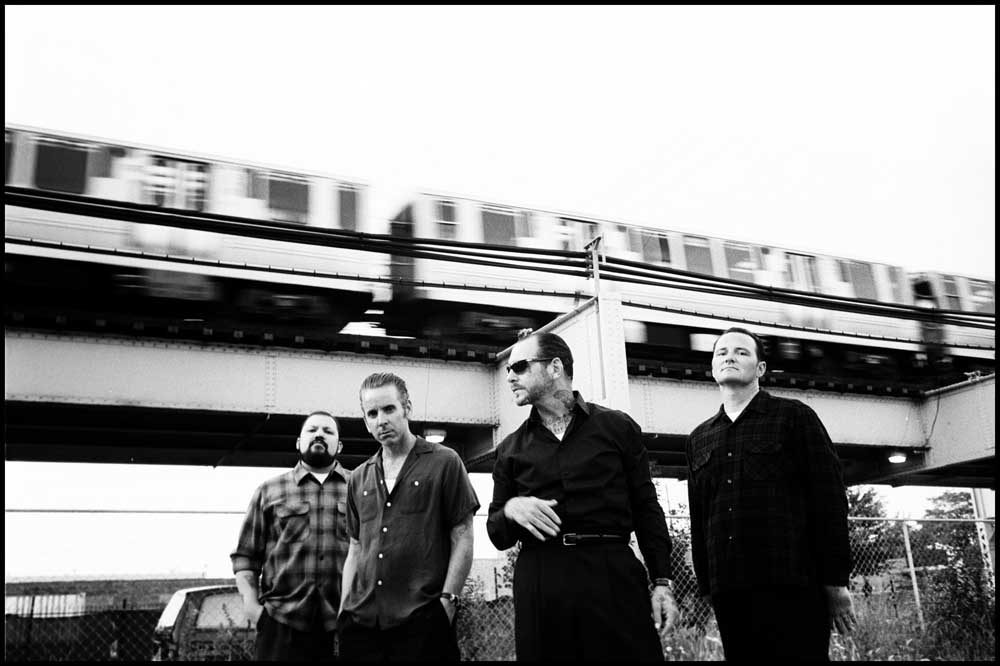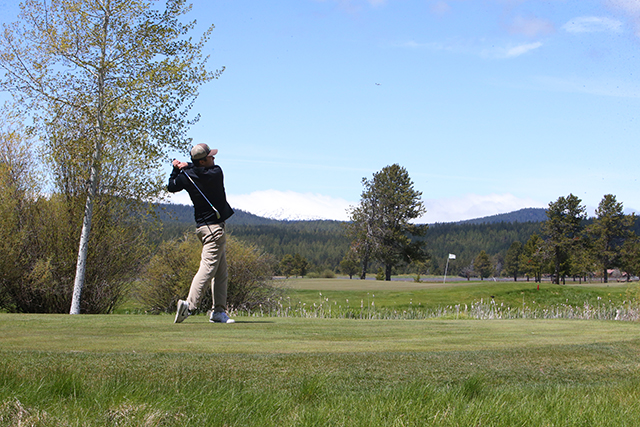Social Distortion to play self-titled album in Bend
Published 12:00 am Friday, September 4, 2015

- Social Distortion plays at the Century Center on Monday. Danny Clinch / Submitted photo
Groove is king when you’re playing in Social Distortion.
Jonny “Two Bags” Wickersham had his work cut out for him in this department when he joined the Los Angeles roots-punk band in 2000. He replaced founding member Dennis Danell who died that same year.
He cut his teeth on the same early ’80s punk scene Social Distortion grew out of, playing with The Cadillac Tramps, Youth Brigade and U.S. Bombs — bands that valued speed more than tight playing in the pocket.
“Everything was kind of fast, and in order to get what we sort of perceived as a lot of energy, or to be able to put a lot of energy in the music, everybody was kind of rushing or playing ahead of the beat,” Wickersham said during a recent tour stop in Silver Springs, Maryland. “And that’s exactly what Mike (Ness, Social Distortion frontman, guitarist and songwriter) doesn’t like at all in his music. Yeah, that’s where my work was cut out for me. … And I swear, I wish somebody would have explained the importance of that to me when I was like 12.”
Social Distortion’s signature sound — a mix of raw punk energy; steady-as-a-freight-train rhythms a la Johnny Cash; and rootsy ruminations on sex, drugs and rock ’n’ roll — came into its own on the band’s self-titled third album, released in 1990.
The band is celebrating the album’s 25th anniversary on the road, playing the 10 songs in order at each show on their nearly two-month summer tour. The band hits the Century Center on Monday.
After 15 years in the band, Wickersham had played nearly every song on the album with the band, save for “A Place in My Heart,” he said. The album is full of songs that have become Social D calling cards — “Story of My Life,” “Ball and Chain,” “So Far Away,” and the Cash cover “Ring of Fire,” to name a few.
Though not in the band at the time the album was recorded and released, Wickersham was close to Ness and the other band members, playing at the same clubs and running in the same social circles. For a while before Danell’s death, Wickersham was his guitar technician. He remembers hearing the album’s rough mixes for the first time before its release and being “blown away.”
“I also went in there thinking that it had a little bit of a different feel than ‘Mommy’s Little Monster’ (1983) or ‘Prison Bound’ (1988) at that point,” Wickersham said. “Looking back on it now, I can see it was with this record that Mike sort of established the sound that he’s been working with ever since.
“And of course I was there to sort of witness the success of the record,” he continued. “The radio in LA, KROQ, picked it up right away, and you could really feel that SD was ready to move up to a different level. There was a lot of excitement around the band; you could feel the energy for sure.”
The album came after Ness’ battle with drug and alcohol addiction, which derailed the band and caused the five-year wait between its debut album “Mommy’s Little Monster” and “Prison Bound.” Many of the songs on “Social Distortion” deal with Ness’ addiction and recovery.
“I was around and we were friends when (Ness) was writing this record, so I guess I was able to kind of be a witness to where he was in his life,” Wickersham said. “I saw what he was going through with his life with girlfriends and friends, police and drugs, getting off drugs and the whole deal.”
Wickersham said the shift in sound to incorporate more roots material was a natural outgrowth of what was happening on the punk scene in Southern California at the time. Those elements were in local bands such as X and its offshoot, The Knitters, and even found their way into Wickersham’s bands Youth Brigade and U.S. Bombs.
“We were all listening to the same stuff — rockabilly, blues, country music — as we were learning about punk,” he said. “To me it was natural; it made sense to me where Mike was taking the band. He’d already made that move on ‘Prison Bound.’”
Social D’s evolution was foretold even before the first album. Wickersham remembers hearing country influences on two early songs from the band on an early ’80s compilation from Posh Boy Records — his first introduction to Social D.
“I can’t remember now even what two Social D songs were on that, but it was very early; ‘Mommy’s Little Monster’ hadn’t been recorded yet,” he said. “I remember thinking back then that one of the songs had a country music vibe to it, even though it wasn’t a country song.”
Even still, “Social Distortion” was a polarizing record for the band’s fan base. Along with the overt country influences found throughout its songs, the album was the band’s first for major label Epic Records.
While on the band’s current tour, Ness has recalled punk purists voicing their displeasure at early shows after the album’s release.
“From Mike’s perspective, I’ve heard him say he definitely got a lot of flack about that, man,” Wickersham said. “He was out there touring the record; I wasn’t out there with him. … He’s been talking about it a little from the stage, the die-hard purists who just wanted to hear punk rock. But I’ve never understood; I never put a lot of thought into it.”
Social D has soldiered through lineup shifts, Ness’ addiction and recovery and a changing punk rock scene since forming in 1978. The band’s current lineup — Ness, Wickersham, bassist Brent Harding, drummer David Hidalgo Jr. and touring keyboardist David Kalish — has remained stable since the release of its seventh and most recent album, “Hard Times and Nursery Rhymes,” in 2011.
That record continued a pattern of long waits between Social D releases, following up 2004’s “Sex, Love and Rock ’n’ Roll.” Before that, the band hadn’t released an album since 1996’s hard-driving “White Light, White Heat, White Trash.”
The band seems determined to follow up “Hard Times” a lot faster. Wickersham said the band will “go dark” and head into the studio after its current tour. But in today’s musical climate, in which bands make the majority of their money on tour, stepping away from the road to record can be tricky.
“It’s not like recording a record is a big part of anybody’s income anymore,” he said. “Unfortunately in a lot of cases, it’s an expense you don’t get back, depending on, obviously, how much you spend to make it. But you gotta have new material; people want to hear new stuff. The music business has really changed in a lot of ways pretty tremendously, and it’s unfortunate how it affects smaller bands — bands out there that want to just get started touring.”
— Reporter: 541-617-7814, bmcelhiney@bendbulletin.com






